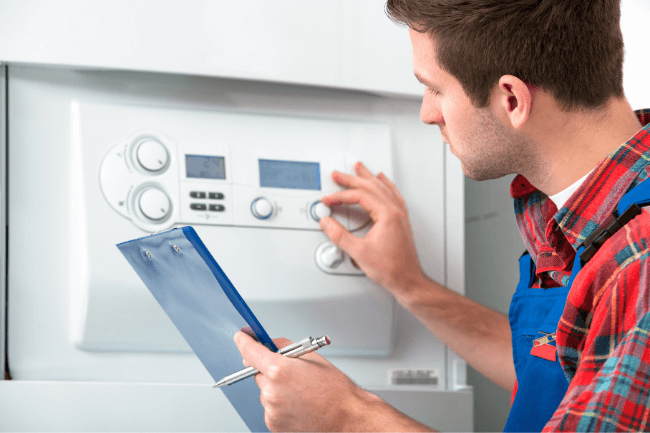With buildings accounting for 39% of the energy-related carbon dioxide emissions, many people are looking for ways to ensure that their home is as energy efficient as possible in order to reduce their carbon footprint.
One of the ways that they might be able to achieve this is by replacing a traditional oil boiler with a hybrid heating system.
But beyond energy efficiency, what are the advantages and disadvantages of one heating system over another?
In this blog we’ll compare oil and hybrid heating systems, to help you understand the main differences between the two, and decide which one might be best for you.
What is an oil hybrid heating system?
First things first, let’s look at what exactly a hybrid heating system is, because, while you might be pretty clear on what an oil boiler is, a hybrid heating system might be a little more foriegn to you.
A hybrid heating system is also known as a dual fuel heating system. There are two elements to an oil hybrid heating system: a traditional gas or oil boiler and a renewable heating system such as an air source heat pump or ground source heat pump.
A hybrid heating system provides you with the familiarity of a traditional boiler but combines it with renewable energy.
The system monitors the temperature outside and automatically chooses the most energy efficient option. Meaning that your heating costs less to run in the long-term and is better for the environment.
Related content: What is an oil hybrid heating system
What are the main differences between oil and hybrid heating systems?
There are a few differences that you need to look at to understand the differences between an oil and hybrid heating system
- How much does the heating system cost per year?
- How cost effective is the heating system over time?
- How much maintenance is required on the heating system?
- How efficient and environmentally friendly is the heating system?
- How long will the heating system last?
| Oil | Hybrid heating | |
| Cost of heating per year | £700*/year | Up to 50% savings comparatively |
| Cost effectiveness (over lifetime) | Cheaper upfrontMore expensive over time | More expensive upfrontCheaper over time |
| Maintenance | Yearly boiler serviceoil tank checks | Yearly boiler serviceOil tank checksHeat pump service |
| Efficiency + environmental impact | 97% efficient | 300-400% efficientHowever very variable in Scotland |
| Lifetime | 10-15 years | Longer due to less use |
*Based on DECC figures from 2020
Oil vs hybrid: cost of heating system per year
The yearly cost of fuel will vary based on a number of personal household factors, so it’s very difficult to give a definitive answer on how much each heating system will cost per year.

Some of the factors that will influence the cost of your fuel, include:
- The efficiency of your boiler
- What size is the house?
- How many people live in the house?
- How many showers/baths etc do your household take?
- Do you always have the heating on?
- What temperature do you set the heating to?
Both heating systems run on oil, so you will need to organise deliveries from your local oil supplier
The DECC estimated that households with an oil boiler will use approximately £700 of fuel per year. Of course this will be highly changeable and dependent on the factors above.
A heat pump draws energy from the ground of the air, meaning that the heating system requires very little oil, especially during the warmer months. Sources suggest that this allows households to save up to 50% on their energy bills year on year.
In conclusion in a like for like home, hybrid heating will cost up to 50% less than oil heating alone.
Oil vs hybrid: cost effectiveness over the heating system lifetime
When you are thinking about oil and hybrid heating systems, it’s important to look at the wider picture in relation to cost and not just focus on the yearly savings.
There are a few factors that affect the cost over the lifetime of the heating system:
- Installation costs of the heating system
- Cost of insulating your home
- The Renewable Heat Incentive (RHI)
To install an oil hybrid heating system it will cost between £5000 – £10,000, which will be almost double what you would pay for a traditional oil boiler (£2500 – £4000).
In addition, a hybrid heating system is most efficient when operating at a low temperature consistently. However, this will work best in a well insulated home. If you live in an old or poorly insulated property then you may need to invest in additional upgrades to ensure that the heating system will be as efficient as possible. If this is the case then you will need to factor these costs into your long term financial assessment.
However, these installation and potential upgrade costs need to be weighed against the longer term financial benefits of a hybrid heating system, and the money that you will likely save.
As well as costing up to 50% less on yearly bills, your heating system should last longer, and you’ll be able to earn money back for up to seven years through the government’s Renewable Heat Incentive (RHI) scheme, which can total up to
£6000. This fund was set-up to encourage installation of renewable heat options, and help lower households’ carbon footprint.
If you are in your forever home (or don’t plan on leaving for a long time), then a hybrid heating system can be a great investment. You may have to pay more upfront for a hybrid heating system, although you will have monthly and yearly savings.
Overall, Boiler Guide suggested that there is actually very little difference in the cost of oil and hybrid if you compare the two over 15 years.
In conclusion, over a lifetime, oil and hybrid heating systems will cost roughly the same.
Oil vs hybrid: how much maintenance will the heating system need?
Boilers and heating systems are not cheap to replace, so taking some time to keep on top of maintenance can lower costs in the long run.

As a homeowner you are responsible for servicing the boiler. How often this needs to be done will depend on the manufacturer, but it is usually recommended every 12 months for both hybrid and oil boilers.
In addition, as both systems run off of oil, you will need to ensure that the:
- Oil tank is maintained
- Oil tank does not run dry
Hybrid heating systems also have the added heat pump, which is either air or heat source. Much like a boiler this will have to be serviced regularly by a qualified technician to ensure that it is running efficiently. How often this needs to be done will depend on the manufacturer, but it’s usually between every 1 and 3 years.
It’s worth noting that in a hybrid heating system the boiler and heat pump share the workload, which means each is used less than the boiler will be in an oil heating system. This means that, while there is more to maintain, the overall maintenance visits may be more straightforward and repairs will be less likely.
In conclusion, hybrid heating systems have a couple more working parts and so require more maintenance, however they may require less repairs due to the shared workload.
Related content:
Oil vs hybrid: efficiency and environmental friendliness of the heating system
Of course, one of the main reasons that hybrid heating systems are gaining popularity is due to their increased efficiency.
Modern boilers are actually a very efficient way of heating your home. They can be up to 97% efficient.
However, a hybrid heating system is even more efficient, especially through the warmer months when it can draw heat from the air or ground.
Although it uses electricity, a heat pump can produce around 3-4 times as much energy as it uses, resulting in a 300-400% efficiency level. The electricity that it does use, extracts residual and renewable heat so it’s a highly efficient use of power.
However, it’s worth noting that one of the main disadvantages with heat pumps in this country is that we have very mixed weather conditions, meaning that heat pumps don’t always work at maximum efficiency and can in fact cost more to heat your house in the Winter.
Generally speaking, hybrid systems should use less fossil fuels overall, which should save you money and reduce your overall carbon footprint.
In conclusion, hybrid boiler systems are generally more efficient and environmentally friendly than oil boilers, however this is a mixed bag in Scotland.
Oil vs hybrid: how long will the heating system last?
The total lifetime of your boiler and heating system will depend on a number of factors including:
- Frequency of use
- Boiler manufacturers
- Regular maintenance
- Luck…
On average, an oil boiler will last around 10-15 years, assuming you keep up-to-date with your boiler servicing.
In a hybrid system the boiler and the heat pump share the workload, meaning the boiler will not need to work as much. This means that a hybrid system will usually last longer than an oil boiler.
In conclusion a hybrid heating system will usually last longer than an oil heating system as it has both a heat pump and boiler to share the workload.
Other ways to reduce your carbon emissions…
While energy efficiency and a reduced carbon footprint is top of mind for many folk, we know that installing a hybrid heating system is not always a realistic option for every household.
The good news is that there are a number of other things that you can to ensure that you use less energy. Some of the things you can do are:
- Use premium kerosene (oil) which contains additives that allow your system to burn more efficiently and cleaner.
- Insulate & draught proof your home
- Turn down your thermostat
- Get your boiler serviced regularly
- Wear cosy clothes
This has the benefit of reducing carbon emissions and saving you money in monthly energy bills.
In conclusion: Is an oil or hybrid heating system better?
Many people are becoming more conscious about the environment and are looking for ways to reduce their personal carbon footprint.
One of the ways they are looking to do this is to reduce their household carbon footprint by installing a hybrid heating system.
A hybrid heating system has many advantages including reduced energy costs and carbon emissions. However, it’s worth noting that in Scotland, the mixed weather conditions mean that heat pumps may not be as efficient an option as they are elsewhere in the world.
Overall, If you are planning on being in your home long term, and have the money to invest in a hybrid heating system upfront, then it might be a good option for your home.
However, if it’s not a feasible option then there are still many ways that you can keep your house warm, your costs down and reduce your carbon footprint without a hybrid heating system.

